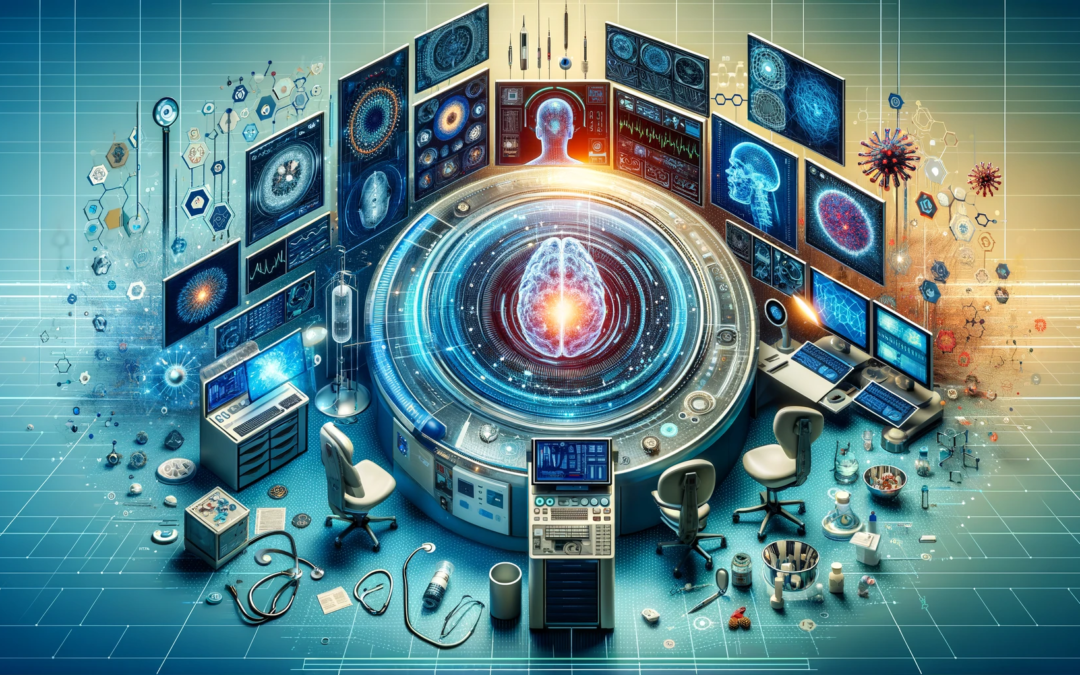In today’s rapidly evolving healthcare landscape, medical diagnostics play a crucial role in identifying and treating diseases. However, the traditional methods of diagnosis often face challenges such as human error, lengthy processing times, and limited access to specialized expertise. Enter artificial intelligence (AI), a groundbreaking innovation that is revolutionizing the field of medical diagnostics.
AI in Early Detection and Diagnosis:
AI technologies are transforming the early detection and diagnosis of diseases. By analyzing vast amounts of medical data, AI algorithms can identify patterns and indicators of diseases such as cancer, neurological disorders, and chronic illnesses. This enables healthcare providers to detect diseases at their earliest stages, significantly improving patient outcomes.
AI in Imaging and Radiology:
AI is also playing a pivotal role in the field of radiology. By leveraging AI-powered image analysis, healthcare professionals can enhance the accuracy of diagnostic interpretations and reduce the risk of errors. AI algorithms can quickly analyze medical images, such as X-rays and MRIs, to identify abnormalities that may go unnoticed by human observers. This technology has already demonstrated its potential to improve patient outcomes and reduce the need for invasive procedures.
AI in Predictive Analytics:
Another area where AI is transforming medical diagnostics is predictive analytics. By analyzing patient data and historical records, AI tools can forecast disease progression and predict patient outcomes. This allows healthcare providers to develop personalized treatment plans and make more informed decisions about patient care. The potential of AI in personalized medicine is immense, offering the possibility of tailoring treatments to individual patients based on their unique characteristics and genetic makeup.
AI in Reducing Healthcare Disparities:
One of the most promising aspects of AI in medical diagnostics is its potential to reduce healthcare disparities. AI-driven diagnostic tools can be deployed in under-resourced or rural areas, bringing advanced healthcare capabilities to populations that previously had limited access. By democratizing healthcare, AI is making it more equitable and accessible to all.
Challenges and Ethical Considerations:
While the potential of AI in medical diagnostics is immense, it also comes with challenges and ethical considerations. Privacy concerns, data biases, and the need for human oversight are among the key issues that need to be addressed. Striking a balance between AI innovation and human expertise is crucial to ensure the responsible and ethical use of AI in healthcare systems.
The Future of AI in Healthcare Diagnostics:
Looking ahead, the future of AI in healthcare diagnostics holds great promise. Advancements in AI technologies, such as machine learning and natural language processing, are expected to further revolutionize diagnostic processes. The integration of AI with other emerging technologies, such as genomics and wearable devices, has the potential to unlock new possibilities for personalized healthcare delivery.
Engaging with the Audience:
We invite our readers to share their thoughts and experiences with AI in healthcare, particularly in relation to diagnostics. We encourage discussions about the potential and limitations of AI-driven healthcare innovations, as well as the ethical considerations that should guide their implementation.
Conclusion:
AI is transforming medical diagnostics, offering unprecedented accuracy, speed, and accessibility. As AI continues to evolve, it has the potential to reshape healthcare by enabling early disease detection, improving patient outcomes, and reducing healthcare disparities. However, it is crucial to approach AI integration in healthcare with a balanced perspective that combines innovation with ethical considerations and patient-centered care.
Visual Elements:
Include images or graphics showcasing AI applications in medical diagnostics, such as AI-powered imaging tools, diagnostic platforms, and data analysis interfaces. Use infographics to illustrate the advancements and impacts of AI in healthcare diagnostics.
SEO Elements:
Integrate keywords like “AI in healthcare,” “AI-driven medical diagnostics,” and “future of medical diagnostics with AI.” Create a compelling meta description that encapsulates the post’s focus on AI’s role in healthcare transformation.










